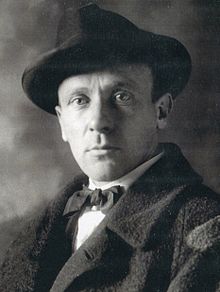
Back Michail Boelgakof AF Булгаков, Михаил Афанасьевич ALT Michail Bulgakov AN ميخائيل بولغاكوف Arabic ميخائيل بولجاكوف ARZ Mikhaíl Bulgákov AST Mixail Bulqakov AZ میخائیل بولقاکف AZB Булгаков Михаил Афанасьевич BA Міхаіл Афанасьевіч Булгакаў BE
Mikhail Bulgakov | |
|---|---|
 Bulgakov in 1928 | |
| Born | Mikhail Afanasyevich Bulgakov 15 May [O.S. 3 May] 1891 Kiev, Russian Empire |
| Died | 10 March 1940 (aged 48) Moscow, Russian SFSR, Soviet Union |
| Resting place | Novodevichy Cemetery, Moscow |
| Occupation | Novelist, short-story writer, playwright, physician |
| Genre | Satire, fantasy, science fiction, historical fiction |
| Notable works | A Young Doctor's Notebook Heart of a Dog The White Guard The Days of the Turbins The Master and Margarita |
| Spouse | Tatiana Lappa
(m. 1913; div. 1924)Lubov Belozerskaya
(m. 1925; div. 1931)Elena Shilovskaya
(m. 1932) |
| Signature | |
 | |
Mikhail Afanasyevich Bulgakov (/bʊlˈɡɑːkɒf/ buul-GAH-kof; Russian: Михаил Афанасьевич Булгаков, IPA: [mʲɪxɐˈil ɐfɐˈnasʲjɪvʲɪdʑ bʊlˈɡakəf];[1] 15 May [O.S. 3 May] 1891 – 10 March 1940) was a Russian writer, medical doctor, and playwright. He is best known for his novel The Master and Margarita,[2] published posthumously, which has been called one of the masterpieces of the 20th century.[3]
He is also known for his novel The White Guard; his plays Ivan Vasilievich, Flight (also called The Run), and The Days of the Turbins; and other works of the 1920s and 1930s. He wrote mostly about the horrors of the Russian Civil War and about the fate of Russian intellectuals and officers of the Tsarist Army caught up in revolution and Civil War.[4]
Some of his works (Flight, all his works between the years 1922 and 1926, and others) were banned by the Soviet government, and personally by Joseph Stalin, after it was decided by them that they "glorified emigration and White generals".[5] On the other hand, Stalin loved The Days of the Turbins (also called The Turbin Brothers) very much and reportedly saw it at least 15 times.[6][7]
- ^ "Bulgakov" Archived 4 March 2016 at the Wayback Machine. Collins English Dictionary.
- ^ Cite error: The named reference
NYT-20240216was invoked but never defined (see the help page). - ^ Mukherjee, Neel (9 May 2008). "The Master and Margarita: A graphic novel by Mikhail Bulgakov". The Times. London. Archived from the original on 18 July 2008. Retrieved 19 January 2009.
- ^ Bulgakov's biography on britannica Archived 2 April 2021 at the Wayback Machine subject of Bulgakov's works (main part of the text starts from the "novel Belaya gvardiya (The White Guard)..."
- ^ Mikhail Bulgakov in the Western World: A Bibliography Archived 27 March 2018 at the Wayback Machine Mikhail Bulgakov in the Western World: A Bibliography
- ^ Shaternikova, Marianna. Why Did Stalin Loved The Days of the Turbuns. Archived 1 November 2016 at the Wayback Machine Почему Сталин любил спектакль «Дни Турбиных». Опубликовано: 15 октября 2006 г.
- ^ Stalin’s secret love affair with The White Guard Stalin’s secret love affair with The White Guard